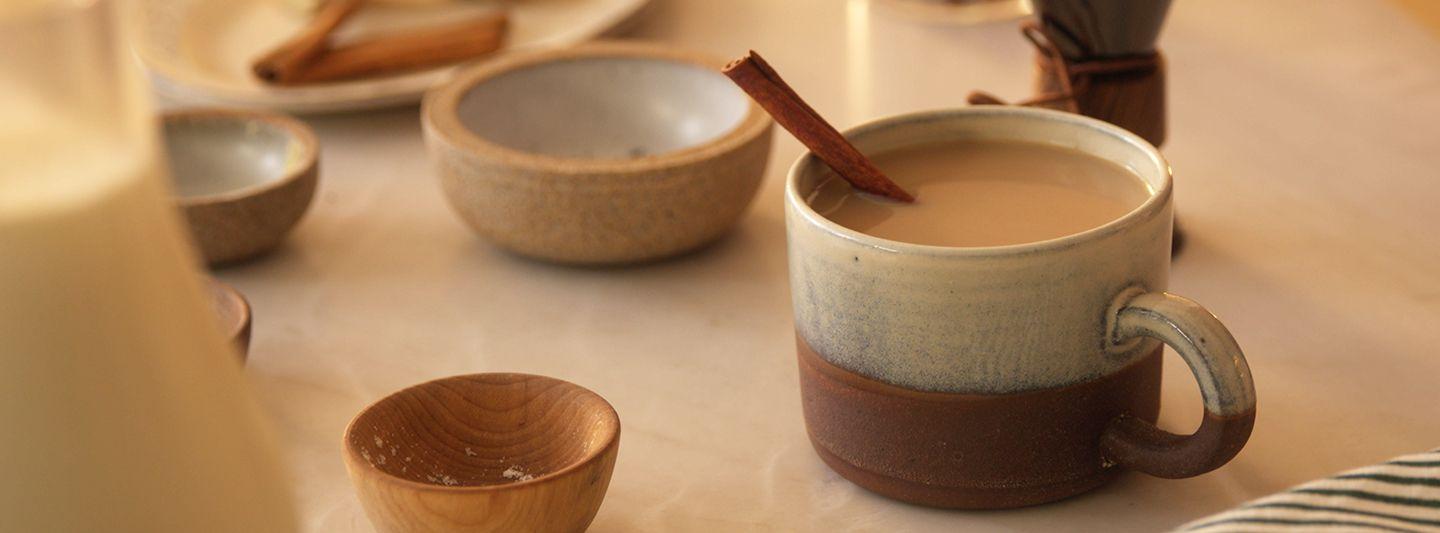Low-sugar drinks: 5 options that avoid glucose spikes
Being well-hydrated is important for sleep quality, energy, and mood. Discover five tasty, low-sugar drinks that will keep you hydrated without spiking your glucose levels.
Christina Stiehl,
Managing Editor
Andrea Givens, MS, RD, CSSD,
Medical Affairs
Published:
February 27, 2025
Updated:
March 14, 2025
Read time:
6 minutes

Discover some tasty no- and low-sugar drinks you can enjoy without spiking your glucose levels.
Understand how coffee can impact your glucose levels, even if you drink it without sugar or sweetened milks.
Learn which drinks to limit to maintain steady glucose levels.
Start Lingo today for just $49
Learn how your body responds to food and exercise with a 2-week plan*, no commitment.
Buy now
Staying hydrated is key for your overall health and for maintaining steady glucose levels. 1 However, many of the popular drinks people reach for contain a lot of sugar that can spike your glucose. This can lead to fluctuations in mood and energy 2, cravings 3, and impact sleep. 4
Fortunately, you can enjoy a range of refreshing and flavorful drinks that have little or no sugar and are unlikely to spike your glucose.
5 glucose-friendly drink options
1. Sparkling or plain water
We know you’ve heard this before, but it bears repeating: drinking plain water is a great and accessible way to maintain hydration. Many people don’t drink enough water, and adults should aim for around 3 liters of water a day. 5 You may need more depending on several factors such as if you exercise or your environmental temperature is warm.
If you find regular H2O boring, plain sparkling water and seltzer are just as hydrating and might be more enjoyable to drink, especially with meals.
If you forget to drink enough water, try setting alerts on your phone or make a habit of carrying around a refillable water bottle to drink from throughout the day. Start early so that you’re not trying to play catch-up in the evening before bed, which can disrupt your sleep if you have to get up at night to use the bathroom.
Try habit-stacking by placing a large glass of water on your nightstand to drink soon after you wake up or keeping a bottle of water in your car cupholder to finish on your commute home. After a few weeks, these choices are likely to become long-term habits.
2. Flavor-infused plain or seltzer water
You can jazz up plain still or seltzer water with slices of orange, lemon, cucumber, or other fruits for a hint of natural flavor. Try adding sprigs of mint or rosemary and have fun with the combination of fresh fruit and herbs to find flavors you enjoy. Sparkling water with slices of fresh ginger and lime make for a particularly zesty combination.
Invest in a water infusion pitcher or just add fruit and herbs to a large bottle of water to keep in the fridge overnight.
You can also infuse your plain water with powdered or liquid water enhancers on the market that contain little to no added sugar and aren’t likely to cause a spike. Popular hydration powders provide flavor and electrolytes for a tasty and hydrating option.
3. Zero-sugar carbonated beverages
There are a number of carbonated beverages on the market that are made with little or no sugar and won’t cause a spike. Popular flavored seltzers such as La Croix and Dash are made simply with carbonated water and natural flavors or fruit essence, which contain no sugar, calories, or non-nutritive sweeteners.
Many popular carbonated drink brands have their own zero-sugar versions, although these are often made with non-nutritive sweeteners and other ingredients and should be consumed in moderation. Despite being sugar-free, these non-nutritive sweeteners yield varying glucose responses in people. By using a continuous glucose monitor (CGM) such as Lingo, you can monitor your individual response to beverages like these to find what works best for you.
It’s important to note that these beverages are still not a replacement for plain water and shouldn’t be consumed in excess.
4. Alcohol: Dry wines and plain liquor
While alcoholic beverages aren’t hydrating (in fact, they do the opposite), you may still be looking to enjoy an alcoholic drink from time to time that won’t cause a spike. Although you may not avoid a spike entirely, we recommend a dry wine like pinot noir or brut sparkling or a mixed drink with a shot of pure liquor such as vodka or gin in plain seltzer with a slice of citrus for the lowest impact on your glucose levels.
For optimal glucose control, it’s best to consume alcohol in moderation — alcohol interferes with your sleep 6, which can negatively impact your glucose. 7 Plus, the more you drink, the more you lower your inhibitions, which may cause you to reach for sugar or carb-heavy snacks that can cause a spike.
5. Hot or cold herbal teas
Herbal teas (without added sugar) are an excellent way to enjoy flavorful beverages without spiking glucose levels.
It’s easy to make herbal teas at home, and you can enjoy them hot or iced. Try to avoid adding sugar and sweetened milks, and be mindful when ordering tea beverages out (especially iced tea variations) that they aren’t made with added sugar or simple syrups. Many of these teas have a natural sweetness on their own. Chamomile, rooibos, hibiscus, and licorice teas are all great options.
A note on coffee
Drinking coffee is a morning ritual for many. The caffeine in coffee (and some caffeinated teas) may cause a glucose spike for some, and adding milk and sugar can exacerbate these spikes. However, over the long term, caffeinated black coffee has been shown to have favorable effects on glucose metabolism. 8
Additionally, caffeine can have a diuretic effect, causing you to urinate more, and if consumed in excess may compromise your fluid balance.
If you’re a regular coffee drinker, try having a large glass of water before your cup of coffee and continue to drink water throughout the day.
Drinks to avoid
Many popular drinks are high in sugar and can spike glucose levels. Some obvious culprits include fruit juice, sugar-sweetened carbonated beverages, alcoholic cocktails, and sweet wines.
When it comes to glucose regulation, sugar-free beverages are a better choice than beverages with added sugar, but it is best to monitor your own tolerance and drink them in moderation. Consuming too many non-nutritive sweeteners has been shown to affect the gut microbiome, which can negatively impact glucose levels. 9
A good rule of thumb is to try to get at least half of your daily fluid requirements through water and the other half may be reached with more flavorful options like the ones outlined above.
Be sure to check the nutrition label of any beverage you buy at the store and watch out for added sugars. When dining out, be mindful of sugar-sweetened beverages like fizzy drinks, lemonade, sweet tea, and mixed cocktails.
A final note from Lingo
Most of the time, water is the best choice to stay hydrated. However, supplementing plain water with some of the beverage choices above can help keep you hydrated while enjoying more flavorful options. We hope this list has provided some inspiration for drinks that aren’t boring and won't spike your glucose levels.
And remember, how your glucose levels respond is unique to you. Using a continuous glucose monitor like Lingo can help you work towards limiting glucose spikes without stopping you from enjoying your favorite drinks.
The Lingo Glucose System is intended for users 18 years and older not on insulin. It is NOT intended for diagnosis of diseases, including diabetes.
The Lingo program does not guarantee that everyone will achieve the same results as individual responses may vary. Consult your healthcare professional before making changes to your diet or exercise regimen or if you have an eating disorder or a history of eating disorders.
© 2025 Abbott. All rights reserved. The biosensor shape and appearance, Lingo, and related brand marks are marks and/or designs of the Abbott group of companies in various territories. Other marks are the property of their respective owners.
ALB-02284
Published:
February 27, 2025
Updated:
March 14, 2025
Read time:
6 minutes


Christina Stiehl is the Managing Editor at Lingo. She graduated from the University of Missouri School of Journalism and has more than a decade of professional editorial experience in the health and wellness industry. Christina has written for top media publications including SELF, PS, Shape, Well+Good, Thrillist, and VICE before pivoting to leading content at health tech companies.


Andrea Givens, MS, RD, CSSD, is a Senior Medical Affairs Specialist and Health Coach at Lingo. Andrea has a passion for empowering individuals to leverage their unique physiology to optimize performance and health. She’s been a registered dietitian since 2010 and has been a board-certified specialist in sports dietetics since 2017. She holds master's degrees in both nutrition science and exercise physiology from San Diego State University.
A healthy choice for your inbox
Sign up for Lingo emails to get science-backed tips, special offers, and The Journey Newsletter.
Start Lingo today
for just $49
Learn how your body responds to food and exercise with a 2-week plan*, no commitment.
- 1 Lingo biosensor with minute-by-minute glucose monitoring.
- Full access to the Lingo app.
- Available over the counter. No prescription needed.
- Works with iOS and AndroidTM
Shop now
Free shipping | 30-day money-back guarantee†
*No commitment. This plan does not auto-renew.
†30-day money-back guarantee is for first time purchases only

